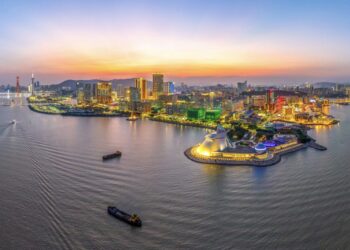MGM China Holdings confirmed the opening of its US$2.9 billion resort on Cotai will be delayed to “mid-2016,” but the company will spend HK$780 million ($100 million) in the meantime to improve its existing casino, MGM Macau, to stay competitive.
When MGM Cotai will open has been in doubt since James Murren, chairman of parent MGM Resorts International and co-chair its 51% owned subsidiary MGM China, said during last week’s second quarter earnings call that the project had encountered delays in obtaining construction permits.
Rival Sands China has had to halt construction of its Parisian Macao on Cotai on government orders for not having the necessary permits, and work is not expected to resume on it before October ahead of a scheduled late-2015 opening.
Grant Bowie, chief executive of MGM China, said in a media briefing on Wednesday that a super-structure permit was obtained this month and the resort is on target for “mid-2016”.
“All of us [the gaming operators] have to go through all of these phases,” he said. “There is no difference between any of the companies, no difference in how we are treated. This is pretty consistent with any jurisdiction in the world.”
Mr Bowie also revealed more detail on the resort, saying it will house 37 villas designed by renowned French architect Jacques Garcia and several multi-level “skylofts” on top of the hotel that will provide high rollers with an “intimate experience”.
“The question is not about creating more volume or quantity, but it’s about the quality of experience we want to create, a unique and high-quality experience,” he said.
The MGM Macau renovations will include a new “supreme gaming lounge” for premium-mass and VIP players that will provide “smaller table groupings” and more privacy, he said.
Addressing the concerns about a market slowdown, he said, “The nature of what Macau represents is actually changing. Everybody realizes that the mass market is critical for the diversification of Macau. If you don’t diversify the mass market you can’t diversify ultimately into non-gaming activities because there is a direct relationship. … Everyone talks about diversifying, but what [are] the consequences of diversification? The consequences [are] we have more mass market because the mass-market customers buy food and beverages, actually go to the shows and tend to spend on retail whereas the VIP customers tend to gamble and gamble and occasionally eat and occasionally sleep.”
He added that he is not concerned either about the recent fall-off in mass revenue growth (down from 35% in the first half to 17% in July) and said he has not detected any “significant changes” in player sentiment.
“I am still committed to the fact that the central government will continue to support Macau,” he said. “But we also have to support the transformation of the central government, which is to [improve] their own economy and structure, and that’s good for all of us in the future.”



































